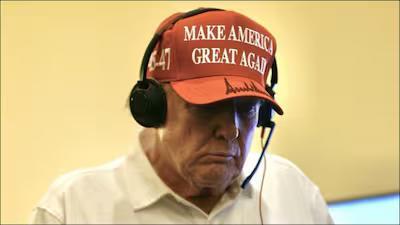
American Brand is in the Toilet: Ex-US NSA Slams Trump’s Tariffs
Former US National Security Advisor Jake Sullivan has criticized US President Donald Trump’s tariffs, stating that the country’s allies are now viewing the US as a “disruptor” and a nation that “can’t be counted on”. Sullivan’s comments come at a time when the world is grappling with the consequences of Trump’s protectionist trade policies, which have led to a rift between the US and its traditional allies.
In an interview with News18, Sullivan, who previously served as National Security Advisor to Vice President Joe Biden, slammed Trump’s tariffs, saying that they have created uncertainty and instability in the global economy. “Countries now are basically saying the US brand is in the toilet and China is looking like a responsible player,” he said.
Sullivan’s comments are significant, given his experience and expertise in national security and foreign policy. As National Security Advisor, Sullivan played a key role in shaping the US’s strategy towards China, and his views on the country’s trade policies are well-informed.
The Trump administration’s tariffs on Chinese goods, imposed in response to alleged intellectual property theft and other trade grievances, have had far-reaching consequences. The tariffs have led to a trade war with China, with both countries imposing retaliatory measures on each other’s goods.
The impact of the tariffs has been felt not just in the US and China, but also in other countries that rely heavily on trade with both nations. India, for example, has been forced to sit down with China to negotiate trade deals, as the US tariffs have disrupted global supply chains and made it difficult for businesses to operate.
Sullivan’s criticism of Trump’s tariffs is not unprecedented. Many economists and business leaders have warned about the dangers of protectionism, arguing that it can lead to higher prices, reduced economic growth, and even job losses. The International Monetary Fund (IMF) has also cautioned against the use of tariffs as a tool for trade policy, warning that they can lead to a “lose-lose” situation for all parties involved.
So, what has gone wrong with the US’s approach to trade? Why has Trump’s “America First” policy led to a perception that the US is a “disruptor” in the global economy?
One major issue is the lack of coordination with allies. Trump’s tariffs have been imposed without consulting or coordinating with other countries, leading to confusion and uncertainty in the global economy. This has created an environment in which countries are forced to make difficult choices about where to do business, and which countries to trust.
Another issue is the lack of a clear strategy. Trump’s tariffs have been imposed in response to a variety of grievances, from intellectual property theft to trade deficits. However, the tariffs have not been targeted at specific industries or products, leading to a broad-based impact on the global economy.
Finally, the tariffs have been imposed without a clear plan for how to resolve the underlying issues. Instead of working with China to address its trade practices, the US has simply imposed tariffs and hoped that China would change its ways. This has led to a stalemate, with both countries dug in and unwilling to compromise.
Sullivan’s comments are a stark reminder of the consequences of Trump’s tariffs. The US brand is in trouble, and the country’s reputation as a reliable partner and leader in the global economy is at risk. If the US is to regain its position as a trusted leader, it must adopt a more coordinated and strategic approach to trade policy.
As Sullivan said, “Countries now are basically saying the US brand is in the toilet and China is looking like a responsible player.” It’s time for the US to take a step back, assess its approach to trade, and adopt a more responsible and cooperative approach to international trade.
News Source:



